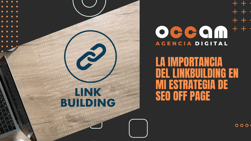Index Content
You will have heard of web positioning or SEO positioning, right? And you will also have heard that SEO positioning is to appear at the top of Google or as Carlos Redondo said on Twitter "Time puts everyone in their place and if you do SEO, it will put you a little higher".
But SEO positioning also goes a little further and it is important to know what type of SEO we are working on to reinforce some factors or others because, for example, SEO off page and SEO on page are not the same thing.
what is SEO?
SEO, in its acronym Search Engine Optimisation, is a series of content optimisation strategies that aim to improve our position in search engines for certain search terms, with the aim of increasing traffic to our website.
Therefore, the strategies we use to position our website will be SEO techniques that will not only drive more traffic to our website, but also improve other features, such as: improving the design of our website to make it more attractive to the user, improving the keywords we use to refer to our content on the web, etc. In short, SEO positioning offers our website many advantages that go beyond finding us in the first position when someone searches for terms related to our website on Google.
However, depending on the SEO factors we are going to work on, we can talk about two types of SEO: off-page and on-page. Each of them is in charge of covering specific characteristics.
- On-page SEO: This is in charge of covering the factors that affect the positioning of our website in Google and that we can correct internally from our own brand. Some of these aspects could be, as we have already mentioned above: the loading speed of our main page, the level of optimisation of the images, if there are a large number of duplicated or repeated elements, etc. In other words, the on-page SEO analysis, as its name suggests, is about knowing the factors that are affecting internally and on which we can act directly.
- SEO off-page: In this aspect it is about discovering which aspects influence the positioning of our web page externally. That is to say, which aspects are affecting our web page positively or negatively. For example, having a high number of negative reviews will mean that our content will not be shown at the top of the search results. Or, on the contrary, if our web page is being linked many times with quality content, our positioning on the Internet will be favoured and will influence the authority with which our web page is seen on the Internet.

what does off-page SEO do?
As we have just mentioned, off-page SEO is the task of knowing which external factors influence the positioning of our website and working on it consists of applying a series of strategies and techniques that help us to obtain external links that point to our website. As we have already mentioned, if we have a high number of external links that lead traffic to our website and, moreover, it is quality traffic, success in SEO positioning is assured.
Off-page SEO is linked to the Page Rank of a web browser such as Google. The Page Rank is a score that Google assigns to all the web pages it displays when a search is performed and which is updated and modified from time to time. This score that Google assigns is based mainly on links received, total visits to the page and the quality of the site in terms of design, updating, content, participation, etc.
In other words, Google will value the quality of our page to decide our positioning based on links from other blogs, publications or social networks that link to our website to guide traffic. As Wendy Piersall said at a conference in 2018, "Google will only love you when others love you first" How right she was!
But how can we improve our off-page SEO to drive traffic to our website? Let us tell you!
Tricks to improve our off-page SEO
There are several actions that, if we carry them out, can end up driving quality traffic to our website.
- Include a blog on our website and update it: If we want other blogs with authority to link to us, we must have a blog on our website in which we publish interesting content related to the field of our company. The most important thing is also that it is updated frequently so that they always find new content when they visit us.
- Include content aggregators: Many prestigious platforms for sharing content can be used to distribute our articles through them and thus reach a wider audience. An example of such a platform could be Dotdash.com .
- Know how to take advantage of social networks: Yes, we have said it hundreds of times, but social networks are such a useful and versatile tool that can help us with everything. If we create a community among the main social networks such as Facebook, Twitter or Instagram, users will start to be interested in our content and share it through them.
- Develop linkbuilding strategies: We have already mentioned that one of the main factors that favour our off-page SEO are links from authority blogs to our website, so we can create a campaign with them, get in touch and explain to them the mutual benefit for both brands if we link to each other in a reciprocal way, as they will also gain more traffic with our links.
After reading all this, you will realise how important SEO positioning is for our website and that driving quality traffic to it is a fundamental aspect of positioning ourselves in Google. If you still have doubts about how to position your website in the search engines and would like to do so, at Occam Agencia Digital we can help you get started in this world. Contact us!





